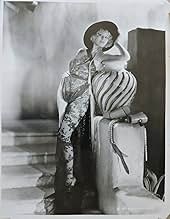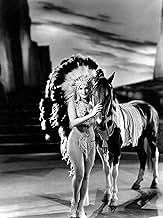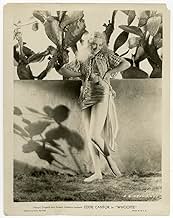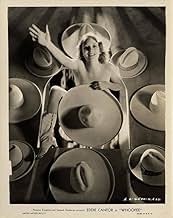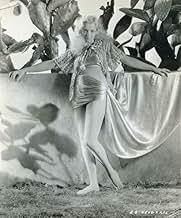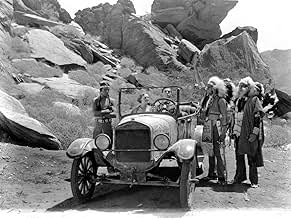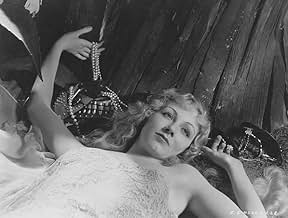Aggiungi una trama nella tua linguaWestern sheriff Bob Wells is preparing to marry Sally Morgan; she loves part-Indian Wanenis, whose race is an obstacle. Sally flees the wedding with hypochondriac Henry Williams, who thinks ... Leggi tuttoWestern sheriff Bob Wells is preparing to marry Sally Morgan; she loves part-Indian Wanenis, whose race is an obstacle. Sally flees the wedding with hypochondriac Henry Williams, who thinks he's just giving her a ride; but she left a note saying they've eloped! Chasing them are j... Leggi tuttoWestern sheriff Bob Wells is preparing to marry Sally Morgan; she loves part-Indian Wanenis, whose race is an obstacle. Sally flees the wedding with hypochondriac Henry Williams, who thinks he's just giving her a ride; but she left a note saying they've eloped! Chasing them are jilted Bob, Henry's nurse Mary (who's been trying to seduce him) and others.
- Regia
- Sceneggiatura
- Star
- Candidato a 1 Oscar
- 2 vittorie e 1 candidatura in totale
- Sheriff Bob Wells
- (as John Rutherford)
- Cowhand
- (non citato nei titoli originali)
- Goldwyn Girl
- (non citato nei titoli originali)
- Cowhand
- (non citato nei titoli originali)
- Goldwyn Girl
- (non citato nei titoli originali)
- Ed - Cowhand
- (non citato nei titoli originali)
- Goldwyn Girl
- (non citato nei titoli originali)
- Goldwyn Girl
- (non citato nei titoli originali)
- Girl
- (non citato nei titoli originali)
Recensioni in evidenza
There are lots of gags, and like the Marx Brothers films, so many that you can't catch them all. Also like the MB, some of the humor is topical, so audiences of today aren't going to get what people would laugh at in 1930.
Through all the jokes - many stupid and many clever - Cantor is a likable guy and also a good singer. As I wrote with another review (Roman Scandals) I am just sorry this talented man doesn't have his films out on DVD. The songs in here are decent, too, some of them very catchy. They also have the added attraction of having the Busby Berkeley joining in.
Make no mistake: this is a "sappy" film, so dated it's extremely stupid in spots....but definitely something for the film collector.
Set in an Arizona dude ranch, Sally Morgan (Eleanor Hunt) is about to marry Sheriff Bob Wells (John Rutherford), though she really loves Wanenis (Paul Gregory), a young Indian living on an Indian reservation near her father's ranch. Because Wanenis is of Indian blood, it is not permissible for a white girl to marry a "red skin." Also staying on the ranch is Henry Williams (played by Eddie Cantor with horn rim glasses), a hypochrondiac pill popper from the east, there for a rest cure, accompanied by his nurse, Mary Custer (Ethel Shutta), who not only feeds him medicine, but happens to be in love with him. Unable to go on with the wedding, Sally arranges for Henry to drive her away in his ran-shackle Ford, leaving Wells and guests at the altar. Since Wells refuses to take "No" for an answer, he goes in hot pursuit of them, as does Miss Custer, leading them all to another ranch, leading to complications, songs and dance numbers.
The musical program includes: "The Cowboy Number" (sung by Betty Grable); "I'll Still Belong to You" (sung by Paul Gregory); "Makin' Whoopee" (sung by Eddie Cantor); "The Mission Number" (sung by chorus); "A Girl Friend of a Boy Friend of Mine" and "My Baby Just Cares for Me" (both sung by Cantor); "Stetson" (sung by Ethel Shutta); "I'll Still Belong to You" (reprise by Paul Gregory); "The Song of the Setting Sun" (sung by Chief Caupolian) and "My Baby Just Cares for Me" (reprise by Cantor).
Of the song tunes, only three show off the Berkeley style: First "The Cowboy Number," featuring two overhead camera shots of dancing cowboys and girls doing circular formations shots climaxed by snake-like effects; "Stetson" having cowgirls dancing while passing their hats to one another, followed by individual close-ups and camera panning through a leg tunnel; and "The Setting Sun," highlighted with one overhead camera shot of Indian doing formations with their feather hats. Among those in the supporting cast are Albert Hackett as Chester Underwood; Marian Marsh as Harriet Underwood; the George Olson Band, and the 1930 Goldwyn Girls (the most famous one here being Betty Grable).
WHOOPEE, the only Cantor musical reproduced from stage to screen, is a prestigious production. Done in early two-strip Technicolor, considering how many early Technicolor musicals are lost, it's fortunate this one has survived. Unlike the subsequent Cantor/Goldwyn musicals, WHOOPEE never played on commercial television in the 1960s and '70s. It was by 1980 did it finally turn up on cable television before turning up on home video in 1986. While the video transfer to this film is excellent, the color on the TV prints are not as good. It's reflection of the times by ways of making reference to popular hit names as Lawrence Tibbett and Amos and Andy are definitely names that would be of a loss today. Cantor's nervous wreck characterization would be carbon copies by future film comedians, especially Danny Kaye, who's Samuel Goldwyn debut, UP IN ARMS (1944), was a partial reworking to WHOOPEE, though not its remake.
As with other Cantor comedies of the day, some gags are humorous (such as Cantor and character actor Spencer Charters comparing their operations, a gimmick they briefly reprized in Cantor's second Goldwyn musical, PALMY DAYS in 1931), others don't come off as well. One low point occurs when Henry (Cantor), disguised in black-face, calls out to Sally Morgan,. Failing to recognize him, she responds very bluntly, "How dare YOU speak to me!" Quite an uneasy feeling for its viewers that could have been handled differently, with her politely replying, "Do we know each other?" Ethel Shutta, repeating her Miss Custer role from the stage version, is a fine comedienne reminiscent to Warner Brothers' own Winnie Lightner. Unlike Lightner, who appeared in numerous films of the early 1930s, Shutta made this her only screen role during the "golden age of Hollywood."
When WHOOPEE became one of a handful of Eddie Cantor musicals to play on cable channel's American Movie Classics in the 1990s, at one point, host Bob Dorian, before the presentation of the film, asked his viewers to watch the film as it was originally intended and not be offended by some racial slurs, jokes, and Cantor disguised in black-face to keep from being arrested. In spite of how viewers might have felt towards this film then and now, WHOOPEE, played longer and more frequently on AMC (1992 to 1998) than any other Cantor musical. WHOOPEE is one of those Broadway transfers to give contemporary audiences a basic idea of the kind of entertainment endured many generations ago. WHOOPEE, as it stands, remains an interesting antique. (***)
Surreal plot if full of schtick and is VERY non-PC (another reason to love it) as Blacks, Indians, Jews, Gays, and Goys get lampooned by Cantor and company.
Several terrific songs by Cantor, "Making Whoopee" and "My Baby Just Cares for Me," and a couple of excellent production numbers by Busby Berkley. Ethel Shutta (pronounced shoo-tay) was smashing in her "Stetson" number. I wish it had been longer.
Among the show girls and dancers are Betty Grable, Ann Sothern, Virginia Bruce, Claire Dodd, and possibly Jane Wyman, and Dean Jagger (of all people) plays a deputy.
The typical 20s romantic subplot between white Eleanor Hunt and Indian Paul Gregory is a drag and is the same things we've seen in the early Marx Brothers and Wheeler and Woolsey comedies.
Spencer Charters plays Underwood, Marian Marsh is his daughter, Jack Rutherford is the sheriff, etc.
The colors are great, the costumes fun. Flo Ziegfeld was involved show there are plenty of show girls in outrageous costumes.
Shutta is a find, but it's Eddie Cantor's show all the way and he's very very funny.
Lo sapevi?
- QuizBased on a Broadway show produced by Florenz Ziegfeld Jr.. "Whoopee" opened at the New Amsterdam Theatre in New York on Monday, December 4th, 1928 and ran for 407 performances. Unfortunately, Ziegfeld lost everything in the stock market crash of 1929. At the time, "Whoopee" was still playing to full houses on Broadway. To bail himself out, Ziegfeld closed the show on Saturday, November 23rd, 1929 and sold the movie rights to Samuel Goldwyn. It is believed that the Broadway show could have run for another year.
- Citazioni
Mary Custer: Oh, poor Henry. Let me hold your hand.
Henry Williams: It's not heavy. I can manage. Hold your own hand.
- ConnessioniFeatured in Precious Images (1986)
- Colonne sonoreCowboys
(1930) (uncredited)
Music by Walter Donaldson
Lyrics Gus Kahn
Performed by Betty Grable and chorus
I più visti
- How long is Whoopee!?Powered by Alexa
Dettagli
- Tempo di esecuzione
- 1h 33min(93 min)

